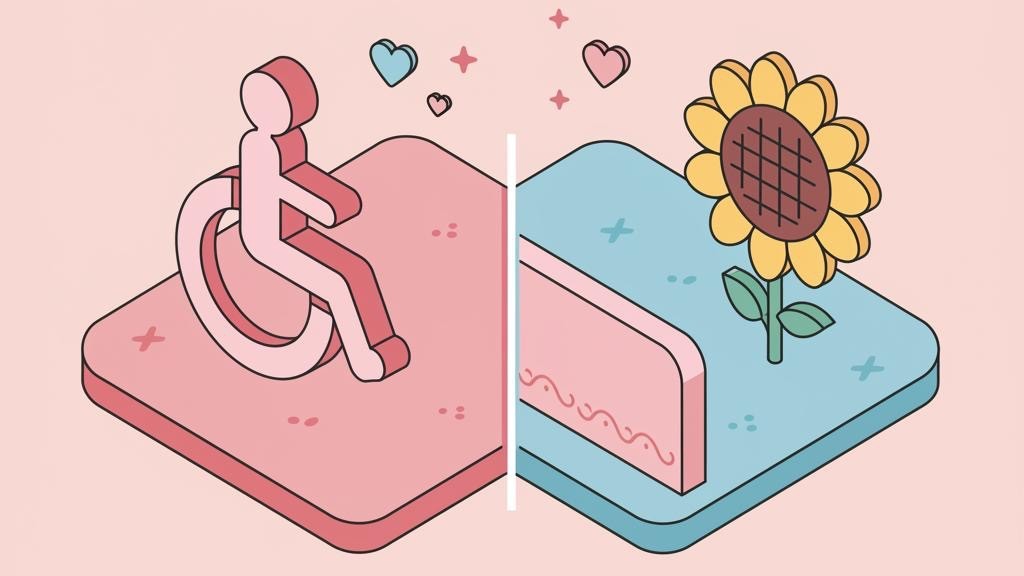The Silent Crack in Our Advocacy: Why Separating Chronic Illness from Disability Rights Hurts Everyone

I still remember the exact moment I realized something was deeply broken in our advocacy landscape. I was sitting in a conference hall where the morning session had been devoted to patient advocacy strategies, while the afternoon focused on disability inclusion. As someone navigating both worlds, I kept thinking: why the hell are these conversations happening separately?
Listen, I've lived this divide for years. On Mondays, I'm in meetings about accessibility and inclusion wearing my disability advocate hat. By Wednesday, I'm discussing medical research funding and healthcare policy wearing my patient advocate badge. And every damn day, I feel the painful gap between these movements that should be walking hand-in-hand.
This isn't just my personal frustration—this is a systemic failure affecting millions of lives.
Two Sides of the Same Broken System
Let's get real about what's happening here. Patient advocacy groups are pouring their hearts into fighting for research, treatment access, and better clinical care. They're hosting fundraisers, lobbying Congress for research dollars, and creating support networks. Their language centers around "finding cures" and "fighting disease."
Meanwhile, disability justice movements are pushing for civil rights, workplace accommodations, and dismantling ableist barriers. They're challenging discriminatory policies, advocating for representation, and building community through shared identity. Their focus is on changing society rather than "fixing" individuals.
And here's the gut-wrenching truth: approximately 67% of adults with disabilities also manage chronic health conditions. Yet only about 14% of major patient advocacy organizations have formal partnerships with disability rights groups. How is this possible? We're literally talking about the same people!
I've sat with too many chronically ill folks who've told me: "I never considered applying for accommodations because I don't see myself as disabled." And I've witnessed disability spaces where people with complex medical needs feel pressured to downplay their desire for medical interventions to be taken seriously as advocates.
This bullshit division doesn't serve anyone.
Real People Falling Through the Cracks
Let me tell you about Maya, a brilliant analyst with lupus who spent three years deteriorating at her job before someone finally mentioned the ADA might apply to her. Or James, who struggled to be taken seriously in disability spaces because he openly discussed wanting better treatments for his MS. These aren't isolated stories—they represent millions of people caught in the gap between movements.
The numbers paint a devastating picture: people with chronic conditions experience unemployment rates 2-3 times higher than the general population. When they do find jobs, they earn approximately 37% less than their colleagues without health challenges. Yet only 22% of corporate DEI initiatives specifically address chronic illness in their disability programming.
This separation creates real harm:
"I spent eight years advocating for research funding for my condition before anyone mentioned I qualified for workplace accommodations," a fellow advocate with fibromyalgia confided in me. "I was fighting so hard for future treatments that I missed out on protections available to me right now."
When Unity Creates Power
But here's where hope breaks through: when these movements connect, we become unstoppable.
During the pandemic, disability activists with decades of experience fighting for remote work joined forces with chronic illness communities. Together, they secured flexible policies that neither group had achieved in years of separate advocacy. The result? Remote work accommodations expanded by over 400% compared to pre-pandemic levels.
In 2023, when pain patient advocates collaborated with disability rights attorneys to challenge discriminatory insurance practices, they won a precedent-setting case benefiting both communities. Their unified approach addressed both medical access and fundamental rights.
These victories aren't coincidences—they're proof of what happens when we demolish the artificial wall between our movements.
Breaking Down the Bullshit Barriers
I'm not here to just point out problems. I'm here to demand solutions:
- Chronic illness organizations need to explicitly incorporate disability rights frameworks into their advocacy training. Stop treating disability identification as something separate from patient experience.
- Disability DEI initiatives must specifically include chronic illness perspectives alongside other forms of disability representation. Fluctuating conditions and medical complexity deserve equal attention.
- We need leadership positions filled by those who understand both worlds—people who can translate between medical and social models of disability without compromising either.
- Universities training future healthcare providers must include disability studies in their curriculum, while disability studies programs need to engage meaningfully with medical complexities.
Most critically, we need spaces where chronically ill patients can explore disability identity without judgment, and disability activists can acknowledge medical needs without compromising their values.
This Is Personal and Political
Every morning, I wake up and calculate my energy reserves for the day. I manage medications, symptoms, and accessibility needs simultaneously. My existence doesn't fit neatly into either advocacy category—I need both movements to see me fully.
When I sit with doctors discussing treatment options, I bring my disability rights perspective. When I fight for workplace accommodations, I bring my understanding of medical complexity. This integrated approach makes me more effective in both spaces.
The separation between these movements doesn't just weaken our collective power—it fragments our very identities, forcing impossible choices between acknowledging medical needs and claiming disability rights.
I refuse to choose. And I'm calling on you to refuse as well.
Whether you identify primarily as chronically ill, disabled, both, or you're still figuring it out—we need your voice in this fight. Join me in demanding that conferences, organizations, and policy initiatives address both medical access and disability rights. Push back when you see one perspective being prioritized over the other.
Our liberation is bound together. Our advocacy should be too.
The time for artificial divisions is over. The movement we need—the movement we deserve—embraces both the medical supports we require and the societal changes we demand.
Are you ready to build it with me?